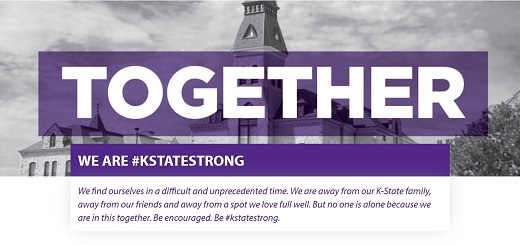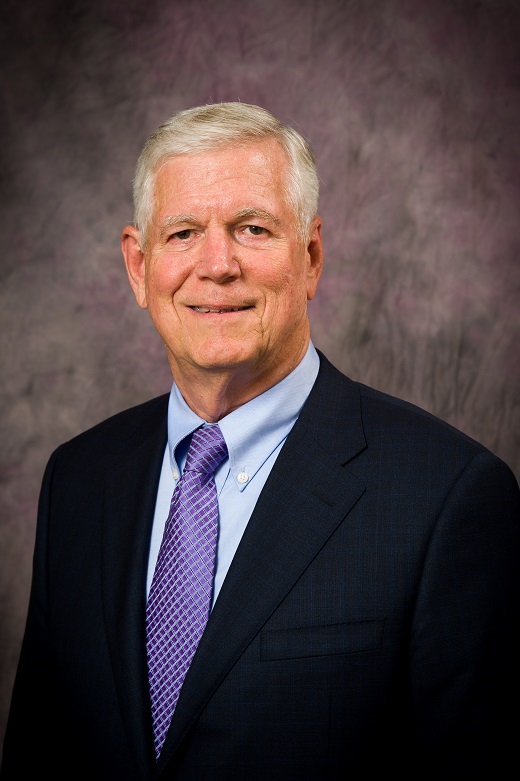06/03/20
K-State Current - June 6, 2020
K-State Current is a weekly news update for the Kansas Board of Regents to apprise the Regents on a few of the many successes and achievements made by K-State faculty, staff and students. 
K-State News
Visit K-State’s “We Are #KStateStrong” site to view brief videos designed to keep the K-State family engaged, connected and inspired during these challenging times.
 University statement on social injustice
University statement on social injustice
Dear K-State Family,
 As we work to reawaken our university community from our COVID-19 isolation, we also must contend with social injustice issues plaguing our country. At the start of the COVID-19 pandemic, around the country, we witnessed acts of prejudice toward those from China and other Asian countries. Now, we are witnessing protests over the killing of black and Latino individuals by law enforcement officers. This is clearly no time to be silent on issues of social justice.
As we work to reawaken our university community from our COVID-19 isolation, we also must contend with social injustice issues plaguing our country. At the start of the COVID-19 pandemic, around the country, we witnessed acts of prejudice toward those from China and other Asian countries. Now, we are witnessing protests over the killing of black and Latino individuals by law enforcement officers. This is clearly no time to be silent on issues of social justice.
A number of K-State faculty and staff have meaningfully engaged the Kansas higher education community in dialogue on these matters. We believe, unapologetically, that there is nothing to debate. Social injustice is alive and well and more often than not, finds its way to the doorsteps and lives of individuals in the most marginalized communities.
We recognize these acts of injustice may not have taken place on our campuses or in our communities, but they can still have a profound impact on our community members. Our students, faculty, staff and administrators are affected by these acts of injustice. In some cases, members of our community may think this could happen to them, their family members or their friends.
The Kansas State University Police Department is dedicated to our community and strives to earn our confidence and respect. We know this respect is hard-won and can be easily lost — it only takes one incident to erase years of goodwill. Our officers are highly professional and well trained in how to interact with our community members. We have confidence they endeavor to uphold our community values. In this time of strife, they also deserve our continued respect and support.
At Kansas State University, we affirm the inherent dignity and value of every person and strive to maintain an atmosphere of justice based on respect for each other. We understand the impact these acts of social injustice have on marginalized communities and their allies. We stand with you and we ask our community members to demonstrate the empathy, sympathy and social responsibility that reflects the same accountability we expect of those entrusted to protect and serve.
Those who have been impacted by recent events are encouraged to contact Student Life or Counseling Services by calling 785-532-6927.
Social injustice has always been with us, but we must stand up for what's right and support those who feel threatened or marginalized.
Richard B. Myers
President
Job losses from COVID-19 especially severe for immigrants, new economics paper finds
 The COVID-19 crisis has caused an unprecedentedly large increase in unemployment in the past few months: between January and April 2020, the unemployment rate skyrocketed from a near-record low of 3.6% to a staggering 14.7%, an unemployment rate not seen since the Great Depression. However, this change has not been uniform across all groups.
The COVID-19 crisis has caused an unprecedentedly large increase in unemployment in the past few months: between January and April 2020, the unemployment rate skyrocketed from a near-record low of 3.6% to a staggering 14.7%, an unemployment rate not seen since the Great Depression. However, this change has not been uniform across all groups.
In a recent National Bureau of Economic Research working paper, "The Adverse Effect of the COVID-19 Labor Market Shock on Immigrant Employment," K-State assistant professor of economics Hugh Cassidy, and co-author George Borjas of Harvard's Kennedy School, find that immigrants have suffered a much greater level of job loss than nonimmigrant workers. For several decades prior to April 2020, immigrant men had higher employment rates than nonimmigrant men. However, the decline in employment for immigrant men has been so severe that this employment advantage actually reversed in April 2020.
The authors investigate what might be driving this immigrant/nonimmigrant difference in job loss. Workers in jobs that are less amenable to remote working suffered much greater job loss than workers in jobs that are easier to perform at home. Since, before the crisis, immigrants were less likely to work in these remotable occupations, they were at more risk of job loss when the crisis struck. However, even accounting for differences in occupations, as well as other characteristics such as education, a large amount of the immigrant/nonimmigrant difference remains unexplained.
The results of this paper emphasize that, though there has been widespread economic hardship due to the crisis, the impacts in the labor market have varied greatly by group. Immigrants, workers in nonessential industries, and workers in occupations that cannot be performed remotely have suffered disproportionately.
The paper also has been posted as an Institute for the Study of Labor discussion paper. Read the IZA summary.
K-State Faculty Highlights
Veterinary research team receives $11.3 million grant to establish infectious disease research center
 From left: Jürgen Richt, left, is director, and Philip Hardwidge is co-director of the new Center on Emerging and Zoonotic Infectious Diseases at Kansas State University, supported by an $11.3 million grant under the Centers of Biomedical Research Excellence program of the National Institutes of Health.
From left: Jürgen Richt, left, is director, and Philip Hardwidge is co-director of the new Center on Emerging and Zoonotic Infectious Diseases at Kansas State University, supported by an $11.3 million grant under the Centers of Biomedical Research Excellence program of the National Institutes of Health.
The National Institutes of Health is awarding a Kansas State University-led team of veterinary researchers with a prestigious five-year, $11.3 million grant under the Centers of Biomedical Research Excellence, or COBRE, program to establish a new Center on Emerging and Zoonotic Infectious Diseases, or CEZID.
The center will comprise four primary research projects that will bridge areas of excellence in the collective infectious diseases programs at Kansas State University involving the colleges of Veterinary Medicine and Arts and Sciences.
"Our projects will examine virulence factors and host-pathogen interactions of various pathogens, utilizing both basic and translational approaches in in vitro systems and in models," said Jürgen Richt, Regents distinguished professor at Kansas State University and a Kansas Bioscience Authority eminent scholar in the College of Veterinary Medicine. Richt will serve as director of the center. Philip Hardwidge, professor of diagnostic medicine and pathobiology in the College of Veterinary Medicine, will serve as associate director.
"The overarching goal of the CEZID is to advance our overall understanding of emerging and zoonotic infectious diseases based on research performed in the state of Kansas," Richt said. "Our goals are also clearly aligned with NIH's strategic plan "Turning Discovery into Health.'"
"The truly unique and competitive advantage of the CEZID program is that it brings a multipronged and multidisciplinary approach to understanding and attacking zoonotic infectious diseases," said Peter Dorhout, vice president for research at K-State. "Our ability to better understand how these diseases behave, which include the family of coronaviruses that comprises our current global pandemic, will enable our researchers to create rapid responses to future calamitous outbreaks that affect both human and animal health. These teams will deliver science-based solutions to improve people's lives."
Richt said there will be two research core facilities to support the research projects and programs: an Animal Model/Pathology Core and a Molecular and Cellular Biology Core, offering unique research infrastructure resources at Kansas State University and the state of Kansas.
The success and growth of CEZID will be enabled through various programs:
• A faculty mentoring program that will provide outstanding mentoring of the research project leaders by nationally and internationally recognized mentors.
• New faculty recruitment at K-State within the center's mission space to ensure the growth and sustainability of CEZID.
• A pilot grant program that will promote center growth by funding smaller projects at universities in the state of Kansas.
• A regional scientific network that will provide interdisciplinary and interinstitutional collaborations and will ensure increased usage of CEZID's core facilities and access to additional core facilities, and training opportunities at universities in the state of Kansas and surrounding states.
According to Richt, these Center on Emerging and Zoonotic Infectious Diseases programs will be the basis by which research productivity is enabled and supported, helping to advance the overall success and reputation of CEZID core projects, pilot projects, postdoctoral fellows and graduate students, and center faculty.
Hardwidge said the Center on Emerging and Zoonotic Infectious Diseases has the potential to provide a vital service to the nation in the area of infectious disease research.
"In this era, interest in the control of the spread of infectious diseases is obviously of substantial importance both within the scientific community and in the general population, Hardwidge said. "We believe this center can greatly expand our general ability to respond effectively to future outbreaks."
K-State researcher develops cell-based MRI contrast agent for efficient cancer diagnosis
 A cell-based magnetic resonance imaging, or MRI, contrast agent can efficiently light up the tumor area, providing crucial diagnostic information for cancer therapy, according to a Kansas State University study recently published in two Royal Society of Chemistry journals, Biomaterial Science and the Journal of Material Chemistry B.
A cell-based magnetic resonance imaging, or MRI, contrast agent can efficiently light up the tumor area, providing crucial diagnostic information for cancer therapy, according to a Kansas State University study recently published in two Royal Society of Chemistry journals, Biomaterial Science and the Journal of Material Chemistry B.
"Our findings suggest that an engineered cell-based MRI contrast agent can provide clinically effective contrast at the site of the tumor or vasculature at a minimal dose thereby differentiating surrounding tissues," said Santosh Aryal, assistant professor of chemistry and principal investigator of the study. "This is a safer and much needed alternative to existing MRI contrast agent."
According to the study's lead author, Sagar Rayamajhi, a graduate student in chemistry, cells release small vesicles, called extracellular vesicles, or EVs, to communicate with each other. The researchers have isolated these vesicles from the immune cell and reconstructed them with contrast agents for efficient cancer diagnosis.
"Due to immune cell origin, these vesicles acquired the properties of immune cell that naturally seeks for disease or inflammatory sites, therefore, reconstructed vesicles can stay for a longer time in blood vasculature to target cancer or disease sites," Rayamajhi said. "We found that by reconstructing the MRI contrast agent in the vesicle system, the contrast enhancement ability increased by more than double. This will allow us to reduce the dosage of clinically used contrast agents about two to three-fold while maintaining contrast in the clinical window."
Rayamajhi said this discovery is important because the current agent used in MRIs is based on gadolinium metal, which can pose a safety issue. The researcher's proposed cell-based MRI contrast agent may be a good alternative for diagnostic imaging.
"The beauty of this study is the optimized use of surface functionalization strategies to engineer magnetic functionalization in EVs while maintaining its membrane integrity," Aryal said.
There are various methods — physical, biological or chemical — to change the surface of extracellular vesicles to add a desired function. Each method comes with specific advantage and disadvantages.
"There is no perfect method," Aryal said. "But, if we choose smartly a combination of two approaches, then, maybe we can get what we want. And, that’s what we did here by combining chemical strategy to synthesize a lipid probe with magnetic contrast agent gadolinium and physical strategy to incorporate the lipid probe in the lipid bilayer of EVs. This is a beautiful combinatorial approach that incorporated magnetic property in EVs while retaining its structural and functional integrity."
In addition to Aryal and Rayamajhi, co-authors include graduate student Ramesh Marasini, chemistry graduate alumnus Tuyen Nguyen, Brandon Plattner, pathologist and clinical associate professor at the Veterinary Diagnostic Lab and David Biller, radiologist and professor of clinical sciences in College of Veterinary Medicine.
This research was supported by the Johnson Cancer Research Center and University Small Research Grants and made possible with the new clinical MRI 3Tesla system in the College of Veterinary Medicine. The researchers add a special thanks to Scott VanAmburg, MRI and radiologic technologist, Veterinary Health Center for his assistance in MRI experiments.
The researcher's next goal is to use a similar cell-based MRI contrast agent for the early mapping of metastasis to improve the cancer survival rate.
K-State Student News
Nancarrow, Horton and Johnson take top honors during K-State Sales Team tryout
 The National Strategic Selling Institute hosted virtual tryouts for the 2020-2021 K-State Sales Team on April 19-21. The tryouts were sponsored by Gartner and consisted of three rounds through a virtual platform. Tryouts allowed for 19 students to compete against each other for student merit awards and an opportunity to interview for a spot on the K-State Sales Team.
The National Strategic Selling Institute hosted virtual tryouts for the 2020-2021 K-State Sales Team on April 19-21. The tryouts were sponsored by Gartner and consisted of three rounds through a virtual platform. Tryouts allowed for 19 students to compete against each other for student merit awards and an opportunity to interview for a spot on the K-State Sales Team.
"Thank you to the Kansas State Sales Team for allowing Gartner to sponsor the team tryouts," said Stephanie Shull, university recruiter with Gartner. "We were blown away by the talent the students demonstrated. It is clear why Kansas State has such a successful sales team year after year — these students are going to be the face of the professional sales industry."
Cecilia Nancarrow, junior in professional strategic selling, Overland Park, placed first and will receive a $1,000 student merit award. Katie Horton, junior in marketing and professional strategic selling, Overland Park, placed second and will receive a $750 student merit award. Lucas Johnson, junior in professional strategic selling, Lawrence, placed third and will receive a $500 student merit award.
The following students competed in the tryouts:
- Molly Bechtel, sophomore in business administration, Overland Park.
- Alyssa Fullington, sophomore in journalism and mass communication, Wichita.
- Hunter Hartner, incoming freshman in business administration, Belleville.
- Zach Hoeven, junior in professional strategic selling, Olathe.
- Katie Horton, junior in marketing and professional strategic selling, Overland Park.
- Lucas Johnson, junior in professional strategic selling, Lawrence.
- Lydia Johnson, freshman in business administration, Prior Lake, Minnesota.
- Cameron Jones, sophomore professional strategic selling, Lenexa.
- Landen King, junior in professional strategic selling, Overland Park.
- Kara Krannawitter, junior in marketing and professional strategic selling, Lawrence.
- Abby Kate LaSala, sophomore in finance, Overland Park.
- Matt Maurer, sophomore in business administration, Overland Park.
- Stacia Mendoza, freshman in business administration, Lenexa.
- Cecilia Nancarrow, junior in professional strategic selling, Overland Park.
- Quin Napier, freshman in business administration, Fairway.
- Ryan Osterhaus, freshman in business administration, Topeka.
- Benjamin Rauth, junior in professional strategic selling, Kansas City, Missouri.
- Collin Thompson, sophomore in professional strategic selling, Olathe.
- Colton Williams, freshman in business administration, Osage City.
All 19 students who participated in the competition received a $50 student merit award for Round 1. The students who advanced to Round 2 and the Final Round received an additional $50 merit award for each round of participation. Each round consisted of a role-play scenario with a representative from Gartner acting as the buyer and facilitating the conversation.
"We greatly appreciate Gartner's support in providing this opportunity for our students in a virtual environment," said Kellie Jackson, managing director of the National Strategic Selling Institute. "Their continuous support and partnership of our program are very important to us as we continue to educate and develop the next generation of sales talent."
The K-State Sales Team is in the College of Business Administration’s National Strategic Selling Institute, which has been named one of the top sales programs in the country for nine straight years by the Sales Education Foundation. The team consists of students who are enrolled in the certificate or major in professional strategic selling. In fall 2018, Kansas State became just the 19th university in the U.S. to offer a major in professional strategic selling. Students can also earn a certificate in professional strategic selling, which is open to all majors at the university. The professional strategic selling program introduces students to the fundamentals of sales and through the innovative curriculum and sales labs allows students to develop the skills needed to be successful.
For more information on Sales Team, please contact Jackson, Sales Team coach, at kelliejackson@k-state.edu.